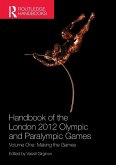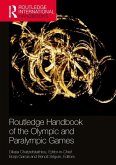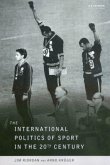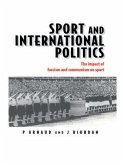David L. Andrews / Stephen Wagg (eds.)Sport and the Cold War
East Plays West
Sport and the Cold War
Herausgegeben:Wagg, Stephen; Andrews, David
David L. Andrews / Stephen Wagg (eds.)Sport and the Cold War
East Plays West
Sport and the Cold War
Herausgegeben:Wagg, Stephen; Andrews, David
- Gebundenes Buch
- Merkliste
- Auf die Merkliste
- Bewerten Bewerten
- Teilen
- Produkt teilen
- Produkterinnerung
- Produkterinnerung
The Cold War spanned some five decades from the devastation that remained after World War Two until the fall of the Berlin wall, and for much of that time the perception was that only on the Eastern side were politics and sport inextricably linked. However, this assumption underestimates the extent to which sport was an important symbol for both power blocs in their ongoing ideological struggle.
This collection of essays from leading international authorities on sport, culture and ideology brings together an impressive body of work organized around key political themes and outstanding…mehr
Andere Kunden interessierten sich auch für
![The Olympics The Olympics]() Vassil Girginov / Jim Parry (eds.)The Olympics90,99 €
Vassil Girginov / Jim Parry (eds.)The Olympics90,99 €![Handbook of the London 2012 Olympic and Paralympic Games Handbook of the London 2012 Olympic and Paralympic Games]() Handbook of the London 2012 Olympic and Paralympic Games80,99 €
Handbook of the London 2012 Olympic and Paralympic Games80,99 €![Routledge Handbook of the Olympic and Paralympic Games Routledge Handbook of the Olympic and Paralympic Games]() Routledge Handbook of the Olympic and Paralympic Games49,99 €
Routledge Handbook of the Olympic and Paralympic Games49,99 €![Understanding the Olympics Understanding the Olympics]() John HorneUnderstanding the Olympics50,99 €
John HorneUnderstanding the Olympics50,99 €![Managing Major Sports Events Managing Major Sports Events]() Milena M. ParentManaging Major Sports Events78,99 €
Milena M. ParentManaging Major Sports Events78,99 €![The International Politics of Sport in the Twentieth Century The International Politics of Sport in the Twentieth Century]() Professor Jim RiordanThe International Politics of Sport in the Twentieth Century78,99 €
Professor Jim RiordanThe International Politics of Sport in the Twentieth Century78,99 €![Sport and International Politics Sport and International Politics]() Sport and International Politics63,99 €
Sport and International Politics63,99 €-
-
-
The Cold War spanned some five decades from the devastation that remained after World War Two until the fall of the Berlin wall, and for much of that time the perception was that only on the Eastern side were politics and sport inextricably linked. However, this assumption underestimates the extent to which sport was an important symbol for both power blocs in their ongoing ideological struggle.
This collection of essays from leading international authorities on sport, culture and ideology brings together an impressive body of work organized around key political themes and outstanding moments in sport, and is at once a political history of sport and an illuminating new perspective on the forces that shaped this unsettled time.
This collection of essays from leading international authorities on sport, culture and ideology brings together an impressive body of work organized around key political themes and outstanding moments in sport, and is at once a political history of sport and an illuminating new perspective on the forces that shaped this unsettled time.
Produktdetails
- Produktdetails
- Verlag: Routledge / Taylor & Francis
- Seitenzahl: 354
- Erscheinungstermin: 29. November 2006
- Englisch
- Abmessung: 240mm x 161mm x 24mm
- Gewicht: 638g
- ISBN-13: 9780415359269
- ISBN-10: 0415359260
- Artikelnr.: 22706304
- Herstellerkennzeichnung
- Libri GmbH
- Europaallee 1
- 36244 Bad Hersfeld
- gpsr@libri.de
- Verlag: Routledge / Taylor & Francis
- Seitenzahl: 354
- Erscheinungstermin: 29. November 2006
- Englisch
- Abmessung: 240mm x 161mm x 24mm
- Gewicht: 638g
- ISBN-13: 9780415359269
- ISBN-10: 0415359260
- Artikelnr.: 22706304
- Herstellerkennzeichnung
- Libri GmbH
- Europaallee 1
- 36244 Bad Hersfeld
- gpsr@libri.de
Stephen Wagg is Reader in Sport and Society at Leeds Metropolitan University, UK. David L. Andrews is Associate Professor in Sport, Commerce and Culture at the University of Maryland, USA.
Introduction 1. Totalitarian Regimes and Cold War Sport: Steroid 'Übermenschen' and 'Ball Bearing Females' 2. Verbal Gymnastics: The Soviet Sports Administration and the Decision to Enter the Olympic Games, 1947-1952 3. Cold War Expatriot Sport: Symbolic Resistance - and International Response - in Hungarian Water Polo at the Melbourne Olympics, 1956 4. Cold War Football: British-European Encounters in the 1940s and 50s 5. 'Oscillating Antagonism': Soviet-British Athletics Relations, 1945-1960 6. 'If You Want the Girl Next Door....' Olympic Sport and the Popular Press in Early Cold War Britain 7. The 'Muscle Gap': Physical Education and U.S. Fears of a Depleted Masculinity 1954-63 8. Good Versus Evil? Drugs, Sport and the Cold War 9. The Cold War and the (Re) Articulation of Canadian National Identity: The 1972 Canada-USSR Summit Series 10. 'One Day When the Yankees....' Cuban Baseball, the United States and the Cold War 11. Playing the 'Race Card': US Foreign Policy and the Integration of Sports 12. 'Miraculous' Masculinity Meets Militarization: Narrating the 1980 USSR-US Men's Olympic Ice Hockey Match and Cold War Politics 13. The Soviet Union and the Olympic Games of 1980 and 1984: Explaining the Boycott to their Own People 14. 'Sport and Politics Don't Mix'. China's Relationship with the IOC during the Cold War 15. Sport After the Cold War: Implications for Russia and Eastern Europe 16. Performing America's Past: Cold War Fantasies in a Perpetual State of War 17. 'Yankee Go Home': Sport and Anti-Americanism in South Korea
Introduction 1. Totalitarian Regimes and Cold War Sport: Steroid
'Übermenschen' and 'Ball Bearing Females' 2. Verbal Gymnastics: The Soviet
Sports Administration and the Decision to Enter the Olympic Games,
1947-1952 3. Cold War Expatriot Sport: Symbolic Resistance - and
International Response - in Hungarian Water Polo at the Melbourne Olympics,
1956 4. Cold War Football: British-European Encounters in the 1940s and 50s
5. 'Oscillating Antagonism': Soviet-British Athletics Relations, 1945-1960
6. 'If You Want the Girl Next Door....' Olympic Sport and the Popular Press
in Early Cold War Britain 7. The 'Muscle Gap': Physical Education and U.S.
Fears of a Depleted Masculinity 1954-63 8. Good Versus Evil? Drugs, Sport
and the Cold War 9. The Cold War and the (Re) Articulation of Canadian
National Identity: The 1972 Canada-USSR Summit Series 10. 'One Day When the
Yankees....' Cuban Baseball, the United States and the Cold War 11. Playing
the 'Race Card': US Foreign Policy and the Integration of Sports 12.
'Miraculous' Masculinity Meets Militarization: Narrating the 1980 USSR-US
Men's Olympic Ice Hockey Match and Cold War Politics 13. The Soviet Union
and the Olympic Games of 1980 and 1984: Explaining the Boycott to their Own
People 14. 'Sport and Politics Don't Mix'. China's Relationship with the
IOC during the Cold War 15. Sport After the Cold War: Implications for
Russia and Eastern Europe 16. Performing America's Past: Cold War Fantasies
in a Perpetual State of War 17. 'Yankee Go Home': Sport and
Anti-Americanism in South Korea
'Übermenschen' and 'Ball Bearing Females' 2. Verbal Gymnastics: The Soviet
Sports Administration and the Decision to Enter the Olympic Games,
1947-1952 3. Cold War Expatriot Sport: Symbolic Resistance - and
International Response - in Hungarian Water Polo at the Melbourne Olympics,
1956 4. Cold War Football: British-European Encounters in the 1940s and 50s
5. 'Oscillating Antagonism': Soviet-British Athletics Relations, 1945-1960
6. 'If You Want the Girl Next Door....' Olympic Sport and the Popular Press
in Early Cold War Britain 7. The 'Muscle Gap': Physical Education and U.S.
Fears of a Depleted Masculinity 1954-63 8. Good Versus Evil? Drugs, Sport
and the Cold War 9. The Cold War and the (Re) Articulation of Canadian
National Identity: The 1972 Canada-USSR Summit Series 10. 'One Day When the
Yankees....' Cuban Baseball, the United States and the Cold War 11. Playing
the 'Race Card': US Foreign Policy and the Integration of Sports 12.
'Miraculous' Masculinity Meets Militarization: Narrating the 1980 USSR-US
Men's Olympic Ice Hockey Match and Cold War Politics 13. The Soviet Union
and the Olympic Games of 1980 and 1984: Explaining the Boycott to their Own
People 14. 'Sport and Politics Don't Mix'. China's Relationship with the
IOC during the Cold War 15. Sport After the Cold War: Implications for
Russia and Eastern Europe 16. Performing America's Past: Cold War Fantasies
in a Perpetual State of War 17. 'Yankee Go Home': Sport and
Anti-Americanism in South Korea
Introduction 1. Totalitarian Regimes and Cold War Sport: Steroid 'Übermenschen' and 'Ball Bearing Females' 2. Verbal Gymnastics: The Soviet Sports Administration and the Decision to Enter the Olympic Games, 1947-1952 3. Cold War Expatriot Sport: Symbolic Resistance - and International Response - in Hungarian Water Polo at the Melbourne Olympics, 1956 4. Cold War Football: British-European Encounters in the 1940s and 50s 5. 'Oscillating Antagonism': Soviet-British Athletics Relations, 1945-1960 6. 'If You Want the Girl Next Door....' Olympic Sport and the Popular Press in Early Cold War Britain 7. The 'Muscle Gap': Physical Education and U.S. Fears of a Depleted Masculinity 1954-63 8. Good Versus Evil? Drugs, Sport and the Cold War 9. The Cold War and the (Re) Articulation of Canadian National Identity: The 1972 Canada-USSR Summit Series 10. 'One Day When the Yankees....' Cuban Baseball, the United States and the Cold War 11. Playing the 'Race Card': US Foreign Policy and the Integration of Sports 12. 'Miraculous' Masculinity Meets Militarization: Narrating the 1980 USSR-US Men's Olympic Ice Hockey Match and Cold War Politics 13. The Soviet Union and the Olympic Games of 1980 and 1984: Explaining the Boycott to their Own People 14. 'Sport and Politics Don't Mix'. China's Relationship with the IOC during the Cold War 15. Sport After the Cold War: Implications for Russia and Eastern Europe 16. Performing America's Past: Cold War Fantasies in a Perpetual State of War 17. 'Yankee Go Home': Sport and Anti-Americanism in South Korea
Introduction 1. Totalitarian Regimes and Cold War Sport: Steroid
'Übermenschen' and 'Ball Bearing Females' 2. Verbal Gymnastics: The Soviet
Sports Administration and the Decision to Enter the Olympic Games,
1947-1952 3. Cold War Expatriot Sport: Symbolic Resistance - and
International Response - in Hungarian Water Polo at the Melbourne Olympics,
1956 4. Cold War Football: British-European Encounters in the 1940s and 50s
5. 'Oscillating Antagonism': Soviet-British Athletics Relations, 1945-1960
6. 'If You Want the Girl Next Door....' Olympic Sport and the Popular Press
in Early Cold War Britain 7. The 'Muscle Gap': Physical Education and U.S.
Fears of a Depleted Masculinity 1954-63 8. Good Versus Evil? Drugs, Sport
and the Cold War 9. The Cold War and the (Re) Articulation of Canadian
National Identity: The 1972 Canada-USSR Summit Series 10. 'One Day When the
Yankees....' Cuban Baseball, the United States and the Cold War 11. Playing
the 'Race Card': US Foreign Policy and the Integration of Sports 12.
'Miraculous' Masculinity Meets Militarization: Narrating the 1980 USSR-US
Men's Olympic Ice Hockey Match and Cold War Politics 13. The Soviet Union
and the Olympic Games of 1980 and 1984: Explaining the Boycott to their Own
People 14. 'Sport and Politics Don't Mix'. China's Relationship with the
IOC during the Cold War 15. Sport After the Cold War: Implications for
Russia and Eastern Europe 16. Performing America's Past: Cold War Fantasies
in a Perpetual State of War 17. 'Yankee Go Home': Sport and
Anti-Americanism in South Korea
'Übermenschen' and 'Ball Bearing Females' 2. Verbal Gymnastics: The Soviet
Sports Administration and the Decision to Enter the Olympic Games,
1947-1952 3. Cold War Expatriot Sport: Symbolic Resistance - and
International Response - in Hungarian Water Polo at the Melbourne Olympics,
1956 4. Cold War Football: British-European Encounters in the 1940s and 50s
5. 'Oscillating Antagonism': Soviet-British Athletics Relations, 1945-1960
6. 'If You Want the Girl Next Door....' Olympic Sport and the Popular Press
in Early Cold War Britain 7. The 'Muscle Gap': Physical Education and U.S.
Fears of a Depleted Masculinity 1954-63 8. Good Versus Evil? Drugs, Sport
and the Cold War 9. The Cold War and the (Re) Articulation of Canadian
National Identity: The 1972 Canada-USSR Summit Series 10. 'One Day When the
Yankees....' Cuban Baseball, the United States and the Cold War 11. Playing
the 'Race Card': US Foreign Policy and the Integration of Sports 12.
'Miraculous' Masculinity Meets Militarization: Narrating the 1980 USSR-US
Men's Olympic Ice Hockey Match and Cold War Politics 13. The Soviet Union
and the Olympic Games of 1980 and 1984: Explaining the Boycott to their Own
People 14. 'Sport and Politics Don't Mix'. China's Relationship with the
IOC during the Cold War 15. Sport After the Cold War: Implications for
Russia and Eastern Europe 16. Performing America's Past: Cold War Fantasies
in a Perpetual State of War 17. 'Yankee Go Home': Sport and
Anti-Americanism in South Korea








